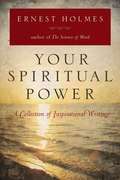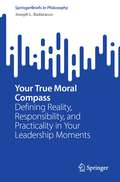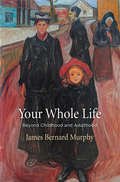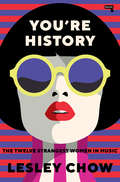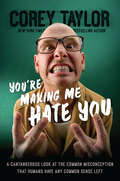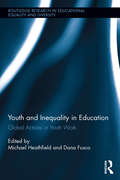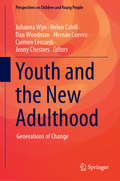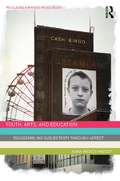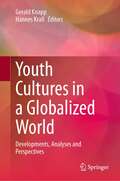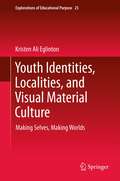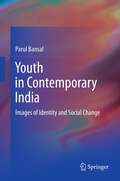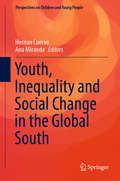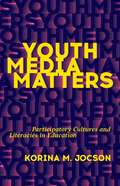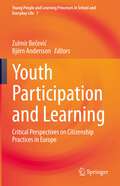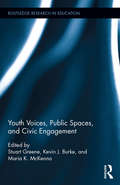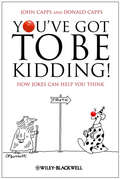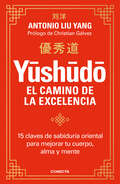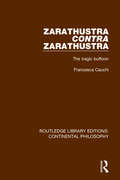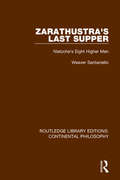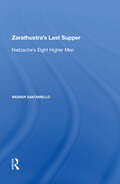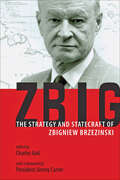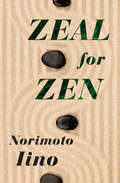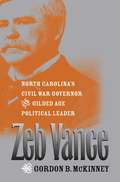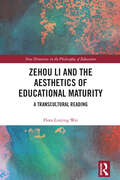- Table View
- List View
Your Spiritual Power: A Collection of Inspirational Writings
by Ernest HolmesErnest Holmes, well known for founding the Church of Religious Science (now called “Centers for Spiritual Living”) and for his magnum opus The Science of Mind , published many smaller papers and treatises throughout his career as an author. Now, for the first time, seven of his best classical works are bound together in a single volume, Your Spiritual Power —including four rare works being published by Tarcher/Penguin for the first time. The works in this amazing collection of motivational writing include: —Immortality: Thoughts on what it truly means to be immortal, and ponderings on what experiences after death may be like. —What Religious Science Teaches: Offering the student of life the best that the world has so far discovered, Holmes shows how the ideas of Religious Science have been developed by Taoism, Hindu scriptures, the Koran, the Talmud, and other great spiritual teachings of the world. —Your invisible Power: Considered by Holmes to be one of his most powerful works, this short book expands on a selection of key topics presented in The Science of Mind, and is illustrated throughout. —Pray and Prosper: An essay discussing Holmes’s understanding of prayer and its relationship to the infinite. Holmes contemplates the meaning of prayer, its objectives, and prayer’s relationship to internal spiritual enlightenment. Additionally, this omnibus will include Holmes’s classic works Think Your Troubles Away, Living Without Fear, and Discover a Richer Life. This beautiful, one-of-a-kind collection—brimming with messages of hope, inspiration, and joy—will be a must-have for students of spirituality and fans of Holmes’s work the world over. .
Your True Moral Compass: Defining Reality, Responsibility, and Practicality in Your Leadership Moments (SpringerBriefs in Philosophy)
by Joseph L. BadaraccoThis book presents a new, powerful, and practical way of making final decisions on the hard, complex, uncertain problems of life and work. What if you have looked at the data, talked with trusted colleagues, and applied all the relevant managerial and ethical frameworks, but you still don't know what is right. How should you make your final decision?This crucial question is rarely asked or answered. And some standard answers – follow your moral compass, your conscience, or your values – offer more inspiration than practical guidance. This book argues that, when we make final, hard decisions, we learn what is right by defining – personally – what is right. We find moral clarity by creating it. The book presents a fresh, challenging, and practical perspective on our hardest decisions. It offers a new conceptual approach for teachers and scholars and practical guidance for leaders and managers.
Your Whole Life: Beyond Childhood and Adulthood (Haney Foundation Series)
by James Bernard MurphyA holistic view of human development that rejects the conventional stages of childhood, adulthood, and old ageWhen we talk about human development, we tend to characterize it as proceeding through a series of stages in which we are first children, then adolescents, and finally, adults. But as James Bernard Murphy observes, growth is not limited to the young nor is decline limited to the aged. We are never trapped within the horizon of a particular life stage: children anticipate adulthood and adults recapture childhood. According to Murphy, the very idea of stages of life undermines our ability to see our lives as a whole.In Your Whole Life, Murphy asks: what accounts for the unity of a human life over time? He advocates for an unconventional, developmental story of human nature based on a nested hierarchy of three powers—first, each person's unique human genome insures biological identity over time; second, each person's powers of imagination and memory insure psychological identity over time; and, third, each person's ability to tell his or her own life story insures narrative identity over time. Just as imagination and memory rely upon our biological identity, so our autobiographical stories rest upon our psychological identity. Narrative is not the foundation of personal identity, as many argue, but its capstone.Engaging with the work of Aristotle, Augustine, Jesus, and Rousseau, as well as with the contributions of contemporary evolutionary biologists and psychologists, Murphy challenges the widely shared assumptions in Western thinking about personhood and its development through discrete stages of childhood, adulthood, and old age. He offers, instead, a holistic view in which we are always growing and declining, always learning and forgetting, and always living and dying, and finds that only in relation to one's whole life does the passing of time obtain meaning.
You're History: The Twelve Strangest Women in Music
by Lesley ChowRaucous, sensual and sublime: how twelve pioneering female artists rewrote the rules of pop.From Kate Bush to Nicki Minaj, from Janet Jackson to TLC and Taylor Swift, pop's greatest female pioneers are simply strange: smashing notions of taste and decorum, and replacing them with new ideals of pleasure. Instead of rehashing biographies, Lesley Chow dives deep into the music of these groundbreaking performers, identifying the ecstatic moments in their songs and finding out what makes them unique. You're History is a love letter to pop's most singular achievements, celebrating the innovations of women who are still critically underrated. It's a ride that includes tributes to Chaka Khan, Rihanna, Neneh Cherry, Sade, Shakespears Sister, Azealia Banks, and many more...
You're Making Me Hate You: A Cantankerous Look at the Common Misconception That Humans Have Any Common Sense Left
by Corey TaylorIn the tradition of the late great George Carlin, New York Times bestselling author and lead singer of Slipknot and Stone Sour Corey Taylor sounds off in hilarious fashion about the many vagaries of modern life that piss him off. Whether it’s people’s rude behavior in restaurants and malls, the many indignities of air travel, eye-searingly terrible fashion choices, dangerously clueless drivers, and--most of all--the sorry state of much modern music, Taylor’s humor and insight cover civil society’s seeming decline--sparing no one along the way, least of all himself. Holding nothing back and delivered in Taylor’s inimitable voice, You’re Making Me Hate You is a cathartic critique of the strange world in which we find ourselves.
Youth and Inequality in Education: Global Actions in Youth Work (Routledge Research in Educational Equality and Diversity)
by Dana Fusco Michael HeathfieldThe transition to adulthood for many is mediated by class, culture, and local/global influences on identity. This volume analyzes the global injustices that create inequities and restrict future opportunities for young people during this transitional time, including poverty, unemployment, human rights, race, ethnicity and location. It critically examines global instances of youth discrimination, offering positive strategies and practices such as youth work that successfully remediate these injustices. With international contributions from Aotearoa New Zealand, Australia, England, Malaysia, Peru, Philippines, Portugal, Morocco, Jordan and the U.S., this volume is particularly important to researchers and scholars in the fields of youth studies, education, and social work.
Youth and the New Adulthood: Generations of Change (Perspectives on Children and Young People #8)
by Johanna Wyn Jenny Chesters Dan Woodman Helen Cahill Hernán Cuervo Carmen LeccardiThis book investigates the life trajectories of Generation X and Y Australians through the 1990s and 2000s. The book defies popular characterizations of members of the ‘precarious generations’ as greedy, narcissistic and self-obsessed, revealing instead that many of the members of these generations struggle to reach the standard of living enjoyed by their parents, value learning highly and are increasingly concerned about the environment and the legacy current generations are leaving for their children and remain optimistic in the face of considerable challenges. Drawing on data from the Life Patterns longitudinal study of Australian youth (an internationally recognized study), the book tells the story of members of these ‘precarious generations’. It examines significant dimensions of young people’s lives across time, comparing how domains such as health and well-being, education, work and relationships intersect to produce the complex outcomes that characterize the lives of members of each of these generations. It also explores the strategies these generations use to make their lives and the ways in which they remain resilient. While the book is based on Australian data, the analysis draws on and contributes to the international literature on young people and social change.
Youth, Arts, and Education: Reassembling Subjectivity through Affect (Routledge Advances in Sociology)
by Anna Hickey-MoodyHow are the arts important in young people’s lives? Youth, Arts and Education offers a groundbreaking theory of arts education. Anna Hickey-Moody explores how the arts are ways of belonging, resisting, being governed and being heard. Through examples from the United Kingdom and Australia, Anna Hickey-Moody shows the cultural significance of the kinds of learning that occur in and through arts. Drawing on the thought of Gilles Deleuze, she develops the theory of affective pedagogy, which explains the process of learning that happens through aesthetics. Bridging divides between critical pedagogical theory, youth studies and arts education scholarship, this book: Explains the cultural significance of the kinds of learning that occur in and through arts Advances a theory of aesthetic citizenship created by youth arts Demonstrates ways in which arts practices are forms popular and public pedagogy Critiques popular ideas that art can be used to fix problems in the lives of youth at risk Youth, Arts and Education is the first post-critical theory of arts education. It will be of interest to students and scholars across the social sciences and humanities, in particular in the sociology of education, arts education, youth studies, sociology of the arts and cultural studies.
Youth Cultures in a Globalized World: Developments, Analyses and Perspectives
by Hannes Krall Gerald KnappThis book examines the relation between the phenomenon of globalization, changes in the lifeworld of young people and the development of specific youth cultures. It explores the social, political, economic and cultural impact of globalization on young people. Growing diversity in their lifeworlds, technological development, migration and the ubiquity of digital communication and representation of the world open up new forms of self-representation, networking and political expression, which are described and discussed in the book. Other topics are the impact of globalization on work and economy, global environmental issues such as climate change, political movements which put “nationalism first”, change of youth`s values and the significance of body, gender and beauty. The book highlights the challenges of young people in modern life, as well as the way in which they express themselves and engage in society – in culture, politics, work and social life.
Youth Identities, Localities, and Visual Material Culture
by Kristen Ali EglintonThis invaluable addition to Springer's Explorations of Educational Purpose series is a revelatory ethnographic account of the visual material culture of contemporary youths in North America. The author's detailed study follows apparently dissimilar groups (black and Latino/a in a New York City after-school club, and white and Indigenous in a small Canadian community) as they inflect their nascent identities with a sophisticated sense of visual material culture in today's globalized world. It provides detailed proof of how much ethnography can add to what we know about young people's development, in addition to its potential as a model to explore new and significant avenues in pedagogy. Supported by a wealth of ethnographic evidence, the analysis tracks its subjects' responses to strikingly diverse material ranging from autobiographical accounts by rap artists to the built environment. It shows how young people from the world's cultural epicenter, just like their counterparts in the sub-Arctic, construct racial, geographic and gender identities in ways that are subtly responsive to what they see around them, blending localized characteristics with more widely shared visual references that are now universally accessible through the Web. The work makes a persuasive case that youthful engagement with visual material culture is a relational and productive activity that is simultaneously local and global, at once constrained and enhanced by geography, and possesses a potent and life-affirming authenticity. Densely interwoven with young people's perspectives, the author's account sets out an innovative and interdisciplinary conceptual framework affording fresh insights into how today's youth assimilate what they perceive to be significant. Supported by a wealth of ethnographic evidence, the analysis tracks its subjects' responses to strikingly diverse material ranging from autobiographical accounts by rap artists to the built environment. It shows how young people from the world's cultural epicenter, just like their counterparts in the sub-Arctic, construct racial, geographic and gender identities in ways that are subtly responsive to what they see around them, blending localized characteristics with more widely shared visual references that are now universally accessible through the Web. The work makes a persuasive case that youthful engagement with visual material culture is a relational and productive activity that is simultaneously local and global, at once constrained and enhanced by geography, and possesses a potent and life-affirming authenticity. Densely interwoven with young people's perspectives, the author's account sets out an innovative and interdisciplinary conceptual framework affording fresh insights into how today's youth assimilate what they perceive to be significant. Supported by a wealth of ethnographic evidence, the analysis tracks its subjects' responses to strikingly diverse material ranging from autobiographical accounts by rap artists to the built environment. It shows how young people from the world's cultural epicenter, just like their counterparts in the sub-Arctic, construct racial, geographic and gender identities in ways that are subtly responsive to what they see around them, blending localized characteristics with more widely shared visual references that are now universally accessible through the Web. The work makes a persuasive case that youthful engagement with visual material culture is a relational and productive activity that is simultaneously local and global, at once constrained and enhanced by geography, and possesses a potent and life-affirming authenticity. Densely interwoven with young people's perspectives, the author's account sets out an innovative and interdisciplinary conceptual framework affording fresh insights into how today's youth assimilate what they perceive to be significant.
Youth in Contemporary India
by Parul BansalThis book endeavors to be a study of identity in Indian urban youth. It is concerned with understanding the psychological themes of conformity, rebellion, individuation, relatedness, initiative and ideological values which pervade youths' search for identity within the Indian cultural milieu, specifically the Indian family. In its essence, the book attempts to explore how in contemporary India the emerging sense of individuality in youth is seeking its own balance of relationality with parental figures and cohesion with social order. The research questions are addressed to two groups of young men and women in the age group of 20-29 years-Youth in Corporate sector and Youth in Non Profit sector. Methodologically, the study is a psychoanalytically informed, process oriented, context sensitive work that proceeds via narrations, conversations and in-depth life stories of young men and women. Overall, the text reflects on the nature of inter-generational continuity and shifts in India.
Youth, Inequality and Social Change in the Global South (Perspectives on Children and Young People #6)
by Hernan Cuervo Ana MirandaThis book gathers international and interdisciplinary work on youth studies from the Global South, exploring issues such as continuity and change in youth transitions from education to work; contemporary debates on the impact of mobility, marginalization and violence on young lives; how digital technologies shape youth experiences; and how different institutions, cultures and structures generate a diversity of experiences of what it means to be young. The book is divided into four broad thematic sections: (a) Education, work and social structure; (b) Identity and belonging; (c) Place, mobilities and marginalization; and (d) Power, social conflict and new forms of political participation of youth.
Youth Media Matters: Participatory Cultures and Literacies in Education
by Korina M. JocsonIn an information age of youth social movements, Youth Media Matters examines how young people are using new media technologies to tell stories about themselves and their social worlds. They do so through joint efforts in a range of educational settings and media environments, including high school classrooms, youth media organizations, and social media sites. Korina M. Jocson draws on various theories to show how educators can harness the power of youth media to provide new opportunities for meaningful learning and “do-it-together production.” Describing the impact that youth media can have on the broader culture, Jocson demonstrates how it supports expansive literacy practices and promotes civic engagement, particularly among historically marginalized youth.In Youth Media Matters, Jocson offers a connective analysis of content area classrooms, career and technical education, literary and media arts organizations, community television stations, and colleges and universities. She provides examples of youth media work—including videos, television broadcasts, websites, and blogs—produced in the San Francisco Bay Area, Los Angeles, New York, and St. Louis. At a time when educators are increasingly attentive to participatory cultures yet constrained by top-down pedagogical requirements, Jocson highlights the knowledge production and transformative potential of youth media with import both in and out of the classroom.
Youth Participation and Learning: Critical Perspectives on Citizenship Practices in Europe (Young People and Learning Processes in School and Everyday Life #7)
by Zulmir Bečević Björn AnderssonThis book contributes to the studies on learning processes occurring outside “traditional” socialization settings such as family and school, by analysing civic and political participation and learning experiences. In this perspective, the book delves into the connections between the concepts of learning and participation and, in various ways and from different perspectives, critically interrogates learning and participation as interrelated phenomena, with the aim of revealing complexities implicated in pathways to adulthood. Being interdisciplinary in its nature (contributors come from disciplinary backgrounds such as educational sciences, child and youth studies, social work, sociology and political science), the volume provides an up-to date analysis of contemporary issues connected to youth participation and learning. The work taps into central areas of everyday life of young people and youth meaning-making and generates and presents qualitative knowledge about what it means to be young in Europe today.
Youth Voices, Public Spaces, and Civic Engagement (Routledge Research in Education #159)
by Stuart Greene Kevin J. Burke Maria K. McKennaThis collection of original research explores ways that educators can create participatory spaces that foster civic engagement, critical thinking, and authentic literacy practices for adolescent youth in urban contexts. Casting youth as vital social actors, contributors shed light on the ways in which urban youth develop a clearer sense of agency within the structural forces of racial segregation and economic development that would otherwise marginalize and silence their voices and begin to see familiar spaces with reimagined possibilities for socially just educational practices.
Youth Work
by Naomi NicholsCombining institutional ethnography and community-based research, Youth Work is a sophisticated examination of the troubling experiences of young people living outside the care of parents or guardians, as well as of the difficulties of the frontline workers who take responsibility for assisting them. Drawing from more than a year of on-site research at an Ontario youth emergency shelter, Naomi Nichols exposes the complicated institutional practices that govern both the lives of young people living in shelters and the workers who try to help them.A troubling account of how a managerial focus on principles like "accountability" and "risk management" has failed to successfully coordinate and deliver services to vulnerable members of society, Youth Work shows how competitive funding processes, institutional mandates, and inter-organizational conflicts complicate the lives of the young people that they are supposed to help. Nichols's book is essential reading for those involved in education, social services, mental health, and the justice system, as well as anyone with an interest in social justice.
You've Got To Be Kidding!: How Jokes Can Help You Think
by John Capps Donald CappsYou've Got to Be Kidding!: How Jokes Can Help You Think is a thoughtful and accessible analysis of the ways in which jokes illustrate how we think critically, and how the thinking process goes awry in everyday human situations Uses jokes to illustrate the various mistakes or fallacies that are typically identified and discussed in courses on critical reasoning Provides an effective way to learn critical thinking skills since jokes often describe real-life situations where it really matters whether a person thinks well or not Demonstrates how philosophy is actually very practical and clearly related to real- life human experiences Explains how developing good reasoning habits can make a real difference in all aspects of one’s life
Yūshūdō. El camino de la excelencia: 15 claves de sabiduría oriental para mejorar tu cuerpo, alma y mente
by Antonio Liu YangUn manual práctico para aprender a ser mejor cada día y alcanzar la excelencia en tu vida personal y profesional aplicando la sabiduría oriental de forma fácil y amena. ¿Sabías que puedes aplicar la sabiduría oriental para mejorar día a día? En este libro, el facilitador intercultural Antonio Liu Yang te guiará por el camino de la excelencia a través de técnicas de la filosofía oriental de manera cercana y realista.Yushudo te ayudará a: *Progresar cada día a través de la filosofía japonesa del kaizen *Mejorar profesionalmente aumentando tu nunchi *Tener buenas relaciones interpersonales con la ayuda del guanxi *Trabajar tus valores creando tu propio bushido *Estar en armonía con tu entorno de acuerdo con los cánones del arte del Feng Shui *Superar las adversidades mediante el kintsugi*Reflexionar cada día con la técnica del hansei *Vivir acorde con tu do, tu propósito de vida Emprende hoy mismo el camino de la excelencia para mejorar tu cuerpo, tu alma y tu mente aplicando 15 sencillas claves de la sabiduría oriental. Reseñas:«Leer este libro te ayudará a mejorar tu vida aplicando conceptos que llevan siglos desarrollándose en Oriente».Amadeo Jensana, Director de programas económicos en CASA ASIA «Los valores, creencias y conceptos del mundo asiático explicados de una manera sencilla y fácil de entender. Esta guía puede marcar un antes y después en tu vida».Anna Zelno, socia fundadora de la Academy for diversity and innovation«Una guía oriental para mejorar tu vida occidental».María Ángeles Blanco, Fundadora y CEO de Escuela de chino Bai «Un libro excepcional con el que aproximarte a la sabiduría oriental. Su lectura es un puente entre Oriente y Occidente que sin duda te permitirá mejorar».Fernando Molina, Presidente del Instituto Seda España «Un libro repleto de claves para una vida plena y eficaz».Vero López, Fisio experta en medicina china y escritora«Antonio Liu Yang es el puente intercultural que necesitamos para transitar el camino a la excelencia».Iván E. Fernández Fojón, Presidente de la asociación cultural coreana Hwarang «Nadie mejor que Antonio Liu Yang para acercar la inmensa sabiduría oriental a los occidentales.Un libro ameno y tan interesante como práctico».Carlos Marcuello Recaj, consultor y profesor de Internacionalización «No tengas prisa por terminar este libro, porque Yushudo se aprovecha mejor si se disfruta con tranquilidad, como una buena ducha que calma y purifica».Pello Zuñiga, Ex Head of User Marketing and Social Media Management en Aliexpress«Un libro claro, práctico, que acerca de manera simple la sabiduría oriental a nuestra realidad occidental ayudando a crear un mundo con mejores valores universales».Ginés Haro, emprendedor social «Este libro detalla de una manera muy práctica y amena aquellos conceptos culturales de Asia-Pacífico quepueden ayudarnos a conseguir una vida más ordenada y plena».Hyun Lee Park, formadora intercultural especialista en la cultura coreana «Esto no es un libro, es una pura gema. Antonio ha conseguido simplificar conceptos asiáticos muy complejosy únicos en frases que todo el mundo puede entender».Jun Wei Du, abogado chinadesk y especialista en LegalTech
Zarathustra Contra Zarathustra: The Tragic Buffoon (Routledge Library Editions: Continental Philosophy #10)
by Francesca CauchiThis study, first published in 1998, makes a lively and welcome contribution to the critical analysis of Nietzsche’s seminal classic This Spoke Zarathustra. Through a close textual reading of the neglected and ill-understood part four of the text, the author seeks to show that Nietzsche’s project of self-overcoming is a failure. Offering herself as a philosopher-priestess of the wisdom of pessimism, Francesca Cauchi invokes a complex of responses in the reader, providing a necessary challenge to any and all advocates of life.
Zarathustra's Last Supper: Nietzche's Eight Higher Men (Routledge Library Editions: Continental Philosophy #11)
by Weaver SantanielloThis book, first published in 2005, explores the historical contextualization of Nietzsche’s thought, focusing on his controversial Thus Spoke Zarathustra. The fourth part of Nietzsche’s Zarathustra consists of Zarathustra’s encounter with eight ‘higher men’ whom Zarathustra meets in succession on his path. The prophet then invites each individual to his cave for the evening festivities, culminating in a blasphemous festival in which his guests worship an ass as God. Revealing each guest’s specific characteristics and distinct roles, the author attempts to discern ‘who’ these guests are or represent (historically) through glimpsing the characteristics specific to each guest.
Zarathustra's Last Supper: Nietzsche's Eight Higher Men
by Weaver SantanielloThis book explores the historical contextualization of Nietzsche's thought, focusing on Nietzsche's controversial Thus Spoke Zarathustra. The fourth part of Nietzsche's Zarathustra consists of Zarathustra's encounter with eight 'higher men' whom Zarathustra meets in succession on his path during the day. The prophet then invites each individual to his cave for the evening festivities, culminating in a blasphemous festival in which his guests worship an ass as God. Revealing each guest's specific characteristics and very distinct roles, Santaniello also attempts to discern 'who' these guests are or represent (historically) through glimpsing the characteristics specific to each representative guest (as portrayed by Nietzsche), and through careful textual analysis, comparison with Nietzsche's other works, historical evidence, and previous scholarly research. This unique exploration of Thus Spoke Zarathustra offers students and researchers alike an invaluable new contribution to Nietzsche studies.
Zbig: The Strategy and Statecraft of Zbigniew Brzezinski
by Charles GatiThe first comprehensive account of Zbigniew Brzezinski's complementary roles as author, academic, policy maker, and critic.Zbigniew Brzezinski’s multifaceted career dealing with U.S. security and foreign policy has led him from the halls of academia to multiple terms in public service, including a stint as President Jimmy Carter’s National Security Advisor from 1977 to 1981. He is a renowned policy analyst and author who frequently appears as a commentator on popular talk shows, and his strategic vision continues to carry a great deal of gravitas. in Zbig, Charles Gati has enlisted many of the top foreign policy players of the past thirty years to reflect on and analyze Brzezinski and his work. A senior scholar in Eastern European and Russian studies, Gati observed firsthand much of the history and politics surrounding Brzezinski’s career. His vibrant introduction and concluding interview with Brzezinski frame this critical assessment of a major statesman’s accomplishments.Contributors: Justin Vaïsse, David C. Engerman, Mark Kramer, David J. Rothkopf, Warren I. Cohen and Nancy Bernkopf Tucker, Robert A. Pastor, William B. Quandt, Robert Hunter, James Thomson, Patrick Vaughan, Marin Strmecki, James Mann, David Ignatius, Adam Garfinkle, Stephen F. Szabo, Francis Fukuyama, Charles Gati
Zeal for Zen
by Norimoto IinoThe Zen scholar and author of Hints in Haiku offers a revealing introduction to Zen thought and practice in this collection of essays. In 1964, when he accepted a visiting professorship at Coe College teaching non-Western studies, Norimoto Iino wrote this uniquely insightful introduction to Zen for his students. As he says in the preface, &“Zen is a subject notoriously elusive. It goes beyond the happiest form of linguistic expression.&” And yet, Iino pursues his topic with illuminating clarity and probing insight. In Zeal for Zen, Iino discusses Zen as an ever-evolving way of seeing and a powerful antidote to the egoistic pursuit of power. He covers a wide range of topics, from Soto Zen and Zen prayer to mathematics, modern physics, and the Zenlike works of English philosopher Alfred North Whitehead.
Zeb Vance
by Gordon B. MckinneyIn this comprehensive biography of the man who led North Carolina through the Civil War and, as a U.S. senator from 1878 to 1894, served as the state's leading spokesman, Gordon McKinney presents Zebulon Baird Vance (1830-94) as a far more complex figure than has been previously recognized. Vance campaigned to keep North Carolina in the Union, but after Southern troops fired on Fort Sumter, he joined the army and rose to the rank of colonel. He was viewed as a champion of individual rights and enjoyed great popularity among voters. But McKinney demonstrates that Vance was not as progressive as earlier biographers suggest. Vance was a tireless advocate for white North Carolinians in the Reconstruction Period, and his policies and positions often favored the rich and powerful.McKinney provides significant new information about Vance's third governorship, his senatorial career, and his role in the origins of the modern Democratic Party in North Carolina. This new biography offers the fullest, most complete understanding yet of a legendary North Carolina leader.
Zehou Li and the Aesthetics of Educational Maturity: A Transcultural Reading (New Directions in the Philosophy of Education)
by Flora Liuying WeiThis book articulates a unique conception of aesthetic educational philosophy and its relation to the Chinese world, drawing on the works of the prominent contemporary Chinese philosopher Zehou Li. The book outlines an aesthetics approach to educational maturity that recognises both the contributions of Western Enlightenment ideals and Chinese traditions, paving the way for an inclusive and post-comparative philosophy. It offers a nuanced discussion of Zehou Li’s thought and how his work can be framed at the border between traditional and modern China, between China and the West. The book combines a discussion of aesthetics with educational theory and considers their combined implications for educational practice (in particular in the first-person perspectives of students, parents, and teachers), in both local and global contexts. Providing a way of doing philosophy of education that carefully considers interactions and overlaps between Western and Chinese civilisation, the book will be of great interest to researchers, academics and postgraduate students in the fields of educational philosophy, educational theory, Chinese and cross-cultural philosophy.
